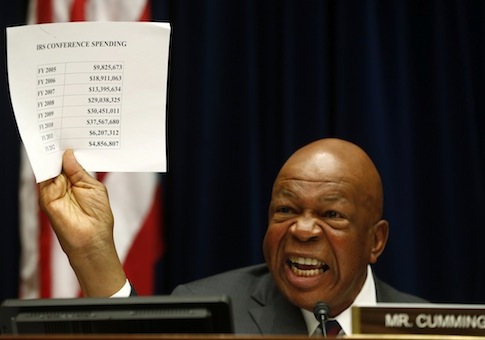Rep. Elijah Cummings (D., Md.), ranking member on the House Oversight Committee, believes the investigation into the IRS targeting of conservative nonprofits is done and his efforts to halt the investigation are drawing attention away from evidence, the Wall Street Journal reports.
Cummings is helping the Obama administration push the notion that there was no political motivation in the IRS targeting. The Journal reports connections Cummings has to the IRS as well as the Obama administration, including his chief counsel, who previously worked for the IRS commissioner during the targeting, and his staff director, who worked as a White House lawyer.
He released the transcript of an interview the oversight committee conducted with a Cincinnati IRS employee named John Shafer despite objections from committee chairman Darrell Issa (R., Calif.).
Mr. Shafer, the manager of an IRS screening group in the Cincinnati office, told committee investigators that in February 2010 one of his employees brought a tea-party application for nonprofit designation to his attention.
Given the media coverage that the tea party was receiving, Mr. Shafer deemed the application a "high profile" matter and alerted his managers to its existence. Shortly thereafter, according to his testimony, lawyers in the IRS's Washington, D.C., office said, "We want to look at the case." On the evidence of the Washington office's interest in that initial case, Mr. Shafer said IRS agents in Cincinnati then held the applications of tea-party groups until they were given "further direction" from D.C.
Case closed, according to Mr. Cummings, who wrote in a letter to Mr. Issa: "These statements by the screening group manager appear to directly contradict your allegations of political motivation."
The Journal reports that many of those who testified contradicted Cummings’ belief that there was no political motivation.
One witness testified that "Washington, D.C., wanted some cases," which was when the Cincinnati office began singling out Tea Party applications.
Another witness told the committee that she was taking directions from IRS lawyers in Washington when she began to flag applications of Tea Party, conservative, and Republican groups.
